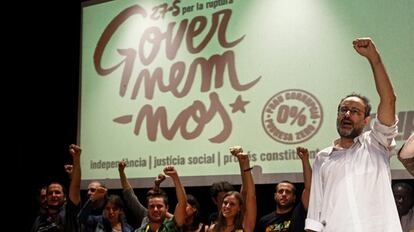Radical CUP party rules out unilateral independence declaration
Group says it will not support Catalan premier Artur Mas’s reinstatement

Radical leftist pro-secession party CUP repeated on Monday that it would not vote to reinstate Artur Mas as Catalan regional premier, and also ruled out making a unilateral declaration of independence, “because the plebiscite was not won.”
CUP will hold the key to forming a Catalan government after seeing its number of seats in the regional assembly rise from three to 10 after Sunday’s pivotal parliamentary elections, which secessionists had been billing as a de facto referendum on independence.
Support from CUP is now essential to Catalan premier Artur Mas, whose Junts pel Sí bloc secured 62 seats on Sunday, short of the 68 required for an absolute majority and control of the chamber.
Political analysts have underscored the difficulty of a joint government between Junts pel Sí and CUP given their differences on just about every issue
But even though the radical leftists are expected to support the more moderate Junts pel Sí on the strength of their joint desire for independence, on Monday they insisted that they would not support Artur Mas’s reinstatement.
“The pro-independence project continues, but notes that Mas is not indispensable,” said CUP’s number two official, Anna Gabriel.
Gabriel added that her group would not invest any individual, no matter what party they are from, with ties to corruption, budget cuts and privatizations. Artur Mas’s Democratic Convergence party is the target of a two-year criminal investigation into a bribes-for-contracts scheme, and his administration was fiercely criticized during the economic crisis for its cuts to regional health and education services.
Together, Junts pel Sí and CUP obtained 47.8 percent of the vote – less than the key 50 percent figure, given that the polls had been positioned as a plebiscite on independence. But they did secure an absolute majority of seats as a result of Spain’s system of proportional representation.
During their campaigning, CUP leaders had stated that only a double majority of votes and seats would award their secessionist drive “a democratic mandate.”
On Monday, party officials ruled out making an immediate, unilateral declaration of independence “because the plebiscite was not won.”
However, CUP top candidate Antonio Baños insisted that the secession process had not lost ground and that it would propose the disobeying of Spanish laws at odds with Catalan sovereignty.
Just minutes after Sunday night’s election results confirmed that CUP would hold the key to power, Baños made a public call for people in the northeastern region to stop obeying Spanish laws.
He stated that the winner of the Catalan elections on Sunday was “the popular power, the power of anti-capitalism and of feminism.”
From now on, he added, “Catalan sovereignty can disobey all Spanish laws that clash with Catalan popular sovereignty.”
In all likelihood, CUP will support the investiture of a provisional secessionist government, but will remain in opposition.
Political analysts have underscored the difficulty of a joint government between Junts pel Sí and CUP given their differences on just about every issue, from EU membership to the ideal economic system for Catalonia.
English version by Susana Urra.
Tu suscripción se está usando en otro dispositivo
¿Quieres añadir otro usuario a tu suscripción?
Si continúas leyendo en este dispositivo, no se podrá leer en el otro.
FlechaTu suscripción se está usando en otro dispositivo y solo puedes acceder a EL PAÍS desde un dispositivo a la vez.
Si quieres compartir tu cuenta, cambia tu suscripción a la modalidad Premium, así podrás añadir otro usuario. Cada uno accederá con su propia cuenta de email, lo que os permitirá personalizar vuestra experiencia en EL PAÍS.
En el caso de no saber quién está usando tu cuenta, te recomendamos cambiar tu contraseña aquí.
Si decides continuar compartiendo tu cuenta, este mensaje se mostrará en tu dispositivo y en el de la otra persona que está usando tu cuenta de forma indefinida, afectando a tu experiencia de lectura. Puedes consultar aquí los términos y condiciones de la suscripción digital.








































